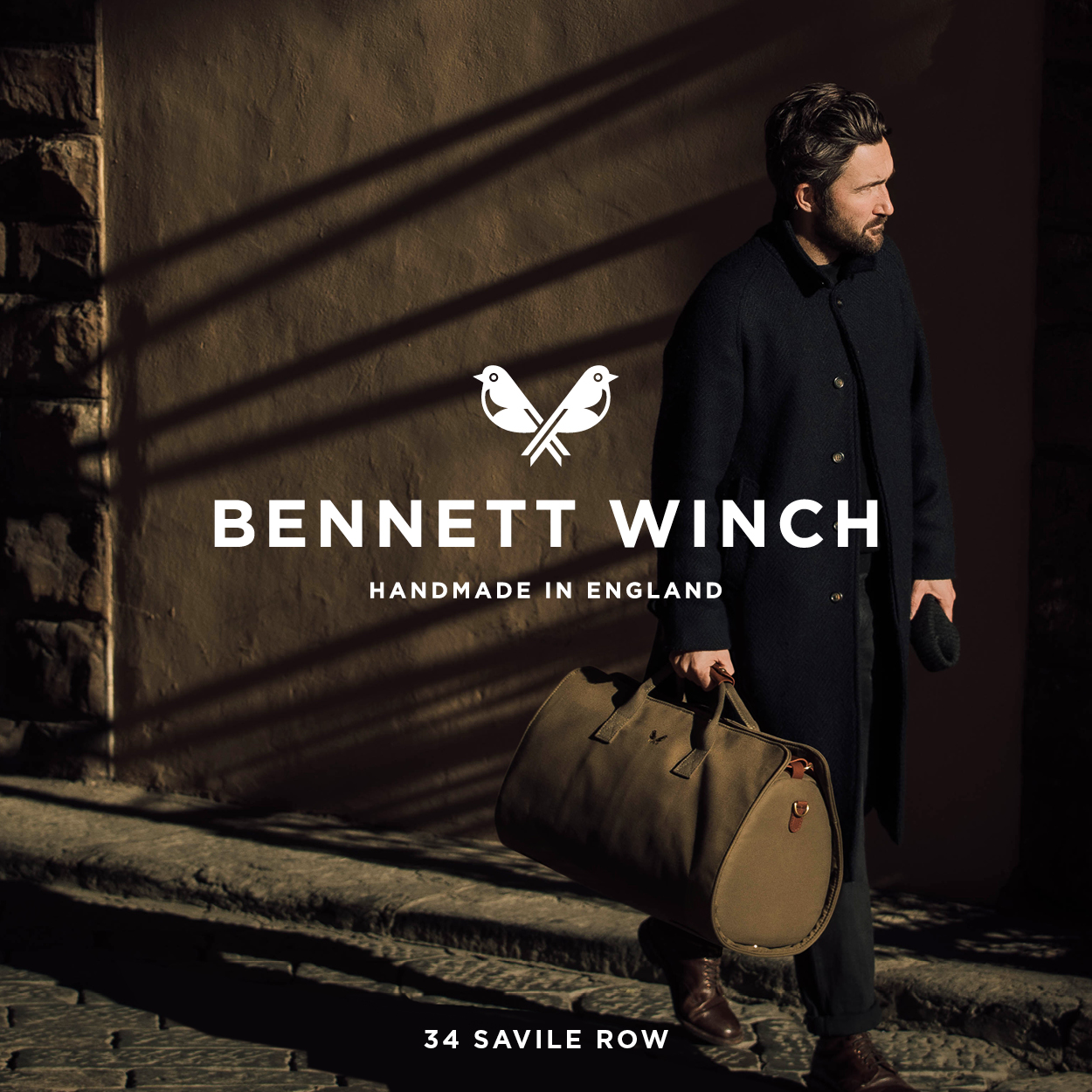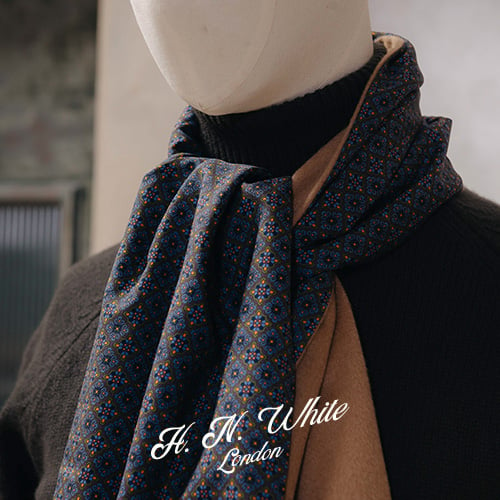100 Hands shirts: Made in Amritsar, India
100 Hands makes perhaps the finest shirts in the world.
They certainly have as much handwork as any shirt I've seen, executed with greater fineness and consistency.
But the most significant thing for many people will be that they are made in India.
In this first article on the company, therefore, I wanted to address that point directly - what assumptions are made about Indian production, and what truth, if any, there is in them.
I did that by going to India to visit the factory myself.
100 Hands is run by a couple, Akshat and Varvara.
They live in the Netherlands, where the company is headquartered, but the factory is in Amritsar, India, where it is managed by Akshat's brother.
Their family business is cotton spinning. For six generations the family has had spinning operations in India, although most of the business today is trading yarn rather than spinning it.
There was always a shirtmaking operation in Amritsar, but it was very small. It was Akshat and Varvara (with previous careers in IT and finance) who wanted to try and turn this into a separate business.
It started slowly, in parallel with their full-time jobs. I had a shirt made by Akshat four years ago (via Chittleborough & Morgan), before the company really existed.
Today, 100 Hands employs 140 people, has moved out of Amritsar to the countryside nearby, and is in the process of adding a second floor to its factory. (That's the countryside above - me on the left, Varvara on the right.)
The workforce is about 60% male, 40% female, and is relatively young. (Most of the people working the sewing machines are men - which is an interesting contrast to Europe.)
There are several very experienced pattern cutters, machinists and embroiderers, but also a large contingent of trainees - often training in parallel with education.
This brings up one of the first concerns westerners have about Indian production: child labour.
Interestingly, the legal working age in India is 18 - by law no one is allowed to work full time until then.
It's also 18 in the UK, but has only been so since 2015. (With various grey areas in between, such as limits on hours per week, internships and so on.)
Younger people can work part-time while in education (again, just as in the UK - I had a paper round at 14) which is why there are a few people in the 100 Hands factory aged 16-18.
Child labour is really about the youngest age anyone is allowed to work at all. In the UK this limit is 13 (except actors and models, with various restrictions) and in India it is 14.
There's nothing even approaching that at 100 Hands, although it is certainly still an issue in other parts of the country.
Another concern is how the workers are paid and generally treated.
I find this interesting, because actually this is far better than any British factory I've been to.
Everyone is paid considerably above the average wage. They all have pensions and everyone, including their families, is given medical insurance. Some also have local accommodation.
By contrast, workers in most British factories (I've been to around 30) are paid on a par with working at the local supermarket. And while many are nice places to work, few come with any ancillary benefits.
The only factories in Europe that come close are the big Italian brands like Kiton, Tod's or Zegna, which were founded on more communal principles and often supply good food, training and childcare.
Of course, these assumptions are made about Indian production because most brands go there in order to make things cheaply. (I actually had three requests along those lines when I posted pictures of the 100 Hands factory on Instagram.)
But 100 Hands shirts are not made cheaply. It takes specialist skill and about a year of intense training to do some of the hand stitching. Some of the pressing and quality checking is also twice as rigorous as other shirt factories I've visited.
(Bear in mind, too, that much of the world's best and finest embroidery comes from in India.)
It may be cheaper in absolute terms to make shirts here, but the quality produced and time required are greater than almost anything made in Europe. The margins are also similar - a 100 Hands shirt would cost considerably more if it was made in Italy or Portugal.
I entirely understand people that would rather buy from local, European manufacturers.
But there's also nothing wrong with supporting developing communities. 'Buy local' and 'Fairtrade' are similar sides of the debate in food production.
I personally feel very connected to the 100 Hands factory, having visited, seen how well it is run, and been welcomed so kindly by everyone there. It felt like a calm oasis in the middle of the burning Punjabi fields.
And my personal view, as I've always said, is that for people interested in the best, quality should always be the first concern. Location and heritage come some way after.
I'll go into more detail on how that quality is achieved at 100 Hands, as well as their range of offerings, in a separate piece.
For details on my clothing, see Friday's post here.




































Makes perhaps the finest shirts in the world.
Bit of a bold statement. Surely better to say that they are amongst the finest in the world?
I’m happy with it, given its elucidation in the next sentence. In terms of make (not fit), they are the finest I have ever seen. My only qualification would be that I haven’t seen everyone’s, hence ‘perhaps’.
Better than d’Avino?
See comment above….
I really appreciate pieces like this, thank you Simon. To any regular consumer, wages and working conditions can only be estimated from price which never tells the full story.
I don’t own any 100 hands shirt yet but after this it’s on top of my to buy list. Do you know if they have any MTO services in northern Europe?
Yes, there are some. I’ll post all details on the next post however
“it is certainly still an issue in other parts of the country”
Hello Simon,
For example what kind of labour is involved in growing and weaving the cotton for the cloth that 100 Hands uses?
Best regards,
SB
They use the same shirting fabrics as every other shirtmaker – Albini, Alumo, Canclini etc. It’s not from India.
Being someone with ancestry from Panjab and having visited their many times this article really resonates.
Panjabis/ Indians are capable of world beating craftsmanship and can replicate pretty much anything (always amazes me how ‘westerns’ go on about the Taj Mahal when there is so much better around every corner in that vast land) .
However , where they often fall short is quality and reliability …. something which 100 Hands have appeared to harness .
I’ve had shirts made in Punjab and whilst the cut is superb (thus the ‘copying’) the stitching , fused collars, loose threads on cuffs (quality) etc left a lot to be desired .
Given the politics of the region industry is actively discouraged in Panjab by the Delhi govt (who wish the state to remain agricultural ) .
Furthermore , India is widely regarded as one of the most difficult countries to set up a business .
Therefore, all credit to Akshat and Varvara for a truly remarkable venture !
Look forward to you reviewing their shirts.
P.S. are you able to disclose exactly where near Amritsar ? …. more to satisfy my curiosity as a visitor to the region .
Hi All,
Great to read about the 100hands Shirt and hope to explore further in wearing these shirts as i stay in India the comment on Governments Policy on Punjab,which i think is a distorted view.Punjab has lots of Excellent Engineering Factories such Eicher,Royal Enfield,Largest Machine tool ,Automobile spare part Manufacturing in India Historically ,the Towns of Ropar,Patiala ,Ludhiana is a Centre of large knitted fabric Manufacturing rivals Tirupur in the South India.There are a Lot of Agro based Industries like Pepsico,Nestle,as the State(People,Govt,Laws) could follow easily standards required by International Food Companies.Punjab also has to be competitive with other States around and one of reasons some Industry is moving to newer ‘cheaper’ areas.Thanks
I would qualify what you say by adding that it is a well established fact that the central Delhi govt actively encourages business towards other neighbouring states e.g. Haryana , Himachel Pradesh.
Often through tax incentives and subsidies.
Thus for example Panjab missing out on call centres , food processing industrial growth.
But that aside Akshat and Varvara deserve praise for having no doubt battled to establish the finest shirt making in the world in Amritsar.
It seems that RTW (via a couple of online retailers) prices are between 700e to 350e (I guess depending on the fabric used) which would put them at the same price range as other makers pretending to be among the best in the world (e.g: Kiton or Charvet), also at the same price level of a lot of full bespoke shirts (again Charvet).
I would be interested to hear your opinion on using 100hands vs doing a completely bespoke shirt. It would be also interesting to hear how the manage the fit process (given the expectations and the difficulties to work in different continents). Just to be perfectly clear, I am not discussing the effort and detail attention put on the shirts. India has indeed a long tradition of brodery, and your pictures show top of the line facilities. I am wondering how to balance the obession we can, sometime, have for details (such as hand stiching) vs fit and practicality. A discussion that reminds me of some of your old articles on napoleatan shirt makers.
Thanks
Nice points, and sure will do.
They do offer a full bespoke service as well, by the way, but it’s the smallest and most recent aspect
I’ve been getting shirts from 100 Hands for a few years now. I would agree – they are perhaps the finest in the world with regard to make (the fit is very good – teetering in Made-to-Measure level and bespoke). I live in the States so getting fitted was a matter of sending photographs of me in my best fitting shirt, measurements and general discussion of how I like shirts to fit. Akshat was incredibly patient and thoughtful working though this process with me. I love ordering shirts from them and love just looking at them and studying the stitching. They’re beautiful.
I am glad Simon took the time to dispel the notion that everything from India comes from a sweat shop. There are people, still, here or there that do things the right way and it’s good to hear about them.
Hi Simon, how they compare to D’Avino shirts, please? I remember D’Avino was the number one for you just a few months ago. Thanks in advance for your response.
The types of handwork done are exactly the same, but 100 Hands does it to a slightly finer level.
100 Hands also don’t currently concentrate on bespoke, whereas that’s all D’Avino does. I’m the process of trying the bespoke 100 Hands are increasingly doing, but it’s not something I can really comment on yet.
Hi Simon!
I am curious on what you mean exactly by “slightly finer level”? So far, D’Avino’s shirts are probably the finest I have seen but have not had the chance to check the 100 Hands shirts. I am sure you will be covering it in the next article but curious on the priced point for 100 Hands bespoke? Although still “expensive” in absolute terms at 350 euros, I find the D’Avino shirts very good value for money given work involved and all the attention Fiorenzo has to try and deliver consistently great shirts and bespoke fit.
Cheers
M
Yes, I’ll cover it elsewhere, but it largely comes down to size, number and accuracy of stitches. For example, the bottom hem on a 100 Hands shirt is rolled tighter, thinner, and secured with more hand stitches. They actually use thinner needles too
How long till a Luxire review?
A few weeks – they’re in the process of making something at the moment
What did you order?
Blue/white bengal stripe, in a cotton/linen blend
Evening Simon
Good to hear that you are giving Luxire a try.
I’ve a couple of their linen/cotton shirts, in pink and navy. Not sure a Bengal will work as you’ve gone for a fairly formal pattern in a fairly informal cloth, but let’s see.
What is clear is that, in terms of value, you will have a remarkable shirt for less than £100 which, providing you got your measurements right, will fit you remarkably well.
Great, thanks. I think useful to frame in a cost perspective. People aren’t expecting an alternative to W&S but is it a good option for people with a little less cash at hand?
Luxire do very good work for the price. My only issue was with the buttonholes, which seemed just a little too small for the buttons and took a lot of fiddling to fasten.
Well, there *was* another much larger issue, but it was my own rather than Luxire’s. I gave them slightly incorrect measurements, which explains why my wife now has some very lovely homemade oxford cloth bags to store her veg 😛
I made a similar mistake with Luxire, too small armhole measurements.
I was able to get gussets put in and can wear the shirts now.
I am thinking of having them make me some pants. I think Ill send a pair to copy.
Fascinating story thanks. Out of interest, what’s the source for the worker benefits like pension you describe? From the owners, or did you get the chance to double check with anyone? Thanks
Just the owners. As much as I try to take a more journalistic approach, this isn’t investigative
Perhaps just say the source then, ie according to the owners. Not expecting Woodward and Bernstein but as an ex journo I would always try to confirm anything with two sources, or quote the single source. Just would be helpful form the reader as I come to yout blog for trusted info – a rare thing these days!
Thanks Adam, and interesting point. Realistically, though, I think the majority of information provided by brands is very hard to confirm with secondary sources – as here – and it would take multiples of work per post to do that.
More important, for me, is to dig a little deeper with questions (why do you do that? are the benefits functional or aesthetic? what does everyone else do?) and do enough research to provide context around the importance or unimportance of the facts provided. Those things put you leaps and bounds ahead of any other mainstream fashion writing.
Growing up in East Asia during the expansion era I would say this kind of benefits were common for the larger factories. Ie in the old days company would build dorm/road/hospital because government wasn’t quite there. The company can afford those too as these non core services are relatively cheap, no longer true as one gets more specialized and general wage increase.
Not to put too fine a point, but the rabid obsession with anything not “Western-made” is ersatz unethical, exploitative and hence downright illegal is quite grating when the author clearly highlights the “differences” in conditions ( as quoted in paragraph 16). Wonder if the questions about “who pays for their pension” etc., am sure wouldn’t be raised if said Firm were, without disrespect, Italian or English. While it’s commendable people want an ethical product, being downright patronizing of a quality product coming from a non- western Firm is frankly being sanctimonious. You heard the man- the product’s good and that’s based on first hand information to dispel the notion that “everything” made outside of a Caucasian environment is made by children, overseen by whip weilding overlords, whose fingers are grossly bent out of shape due to overwork! Sheesh!
You Mr. Crompton are doing commendable work bringing us exciting information that serves to educate and indulge ourselves in what we love- beautifully made clothes.
Thank you.
If you wouldn’t mind, please dial down the hyperbole though. Other commenters are asking reasonable questions. Cheers
You are right, I probably wouldn’t ask that about a European or USA- made piece. But then there’s Rana Plaza so you can understand why westerners might want to double check surely?
Perhaps 18 years or so ago I visited the Lasage embroidery workshop within the home of Jean-Francois Lasage in Chennai, India. There I saw some of the most beautiful embroidery in the world being performed by an all Indian crew. They were / are an extremely talented workforce and their work there (interiors related rather than couture fashion) was worthy of or equal to anything that was done in Paris.
Hi Simon,
I agree, 100 hands are the finest shirts I’ve ever seen until now. I own 5 shirts which I ordered from Viola Milano. I know that a few other sources in Europe offer 100 hands shirts but I was wondering if the fit or any details of the shirts changes between these different retailers in terms of “Made for….” or “Collaboration with…”. Honestly, this uncertainty keeps me standing away from ordering such expensive shirts from different sources. Do you have any information about this?
Thanks,
Karsten
Interesting – no I don’t Karsten, but I’ll ask them about it and try to include it in the next post
Thank you for a very well-written and interesting post! I have only heard great things about 100 Hands, and the collars look incredible.
Hi Simon,
I know the make may be finer than a company like Marol but it seems like Marol are the best shirt stylists? They are masters at combining great buttons, shirt fabric, and other details like specific collars to make shirts that are very aesthetically pleasing.
What are your thoughts?
That’s a much more subjective area Raj, and personal. Personally I think Drake’s are one of the best for styling
Simon,
Are you familiar with Camiceria Piccolo?
If so, something you would recommend?
Thanks,
S
You mean the fabric suppliers/makers, rather than Salvatore Piccolo?
I’ve met them a couple of times, but not had anything made. I can’t really comment I’m afraid.
Hey Simon – what are you wearing??
See Friday’s post on holiday pics….
Dear Simon,
I would like to first welcome you and Thank you, that indeed you visited a factory and Atelier in India.
Finally on this blog we can proudly discuss something Made in India. It is very fulfilling and satisfying to see some talented individuals who are crossing the borders and taking the country of origin globally.
I am an Atelier owner as well and do Bespoke handmade Jackets and Trousers on very small scale and hence I know the challenge we face in producing world class quality.
The other point that I would like to mention in this forum is that despite the fact that if we produce very good quality till that product / service crosses the border and till we get endorsed by western countries and patrons from there we don’t get established as a world class quality producer.
I hope this 100 hands story becomes motivational story for many more Artisans to come forward and take the bold step. Awaiting more information on the same. Best wishes for your blog as well since it’s a rare and unique forum.
Thank you.
Owais
Thanks Owais, pleased I could help
Hi Simon,
A fantastic piece on the 100Hands factory; I congratulate you on this. It’s great to have an insight into a factory other than say, the UK or Italy. Being of Indian origin, Punjabi actually, this article has obviously struck a cord closer to the heart. I know you’ve presented stuff from the far east too, which was equally interesting. I was just wondering when you might be presenting your article about the actual shirt commissioned?
Best regards,
J
Thanks J. There will be another piece in about two weeks
An interesting piece of journalism made more valuable by your visit – one point to pick up on is who paid for the visit – was it a sponsored trip? In the interests of proper reporting I think it needs to be stated. Indeed it shouldn’t necessarily be a problem as many articles are written where some form of interest that is declared – particularly so in the travel/motoring/luxury industries. Long term readers will of course know that your consistent approach to proper criticism remains (commercial value awaits for your next article). I accept the points on quality, though you are yet to commission Marol or Frank Foster amongst others? Obliquely you have historically stated that there is little difference in shirts between hand made and machine made – accepting that fit is the same – has your view now changed? You make a strong case re. working conditions, all accepted, however as a matter of balance I do not agree with the no questions laissez faire approach to trade. Nothing to do with working conditions but the destruction of local manufacturing. Currently we operate outside of a level playing field. Average wage in Punjab is USD $2,300 p.a., UK is $42,000 – you make claims – without detail – re. generous wages but surely they are only relative to the already low local wages. Cost per shirt (The Rake) starts at £320 (USD $440) per shirt. I also note the company, perhaps for tax advantages, is based in Holland (a comkon practice in the EU). Until overseas wages are higher and tax differentials decrease UK manufacturing will continue to decline and with it skill, knowledge and product understanding. The same applies to the U.S. This also affects suppliers such as mills. Italy, France and Germany have taken a much more protective approach (Parisian Gentleman details some of this re. protected artisans for example ). The decline has been evident across all UK manufacturing industries. This then causes drag on the national economy and delivers a higher tax burden on all here – including you. For many, many reasons location does make a difference. It is absolutely not the same as ‘Fairtrade’ as this is targetted against the neo-colonial practice of price pressuring raw material exporters often based in developing nations (coffee and cocao are examples) vs. importation of a manufactured good. By this extension of logic ‘Buy Local’ would therefore stand in opposition to importing from overseas. The conflation of these practices doesn’t really stand up to analysis.
Thanks. A lot of points there, and many, particularly how much local industry should be protected or free trade allowed, are obviously far too large for here and have no clear answers. I am having Marol shirts made and have seen Frank Foster shirts, but neither have anywhere near the amount of handwork as D’Avino or 100 Hands. Their priorities are simply different. I’m not sure what you are referring to specifically when you mention the difference in quality between shirts, but we can go into that on the next post. On costs, 100 Hands paid for my flight, though as I’ve always said, that makes no difference to the coverage and there is no guarantee of good coverage. On Fairtrade, yes this is very specific, but most consumers buy these products simply because they want to support workers in developing countries. There would be nothing wrong with buying shirts from 100 Hands with the same motivation. And lastly, Akshat and Varvara live in the Netherlands. It’s nothing to do with tax
This is the beauty of a free market economy. You are free to choose not to support suppliers, artisans and craftsmen that you do no want to support. If you don’t believe in the manufacturing practices of 100 Hands then you are free to give your money to local makers.
If enough people believe so strongly in protecting industries close to home then they will be willing to pay higher prices for goods made at home.
When has there ever been a level playing field? What is the cost to manufacture in California versus a different U.S. state? What is the cost to manufacture in an Eastern European country like Belarus versus Spain or the U.K.? Why should there be a level playing field?
Who are you to judge where a company is based and for what reason? EU taxes are onerous as it is. Everyone is free to do as they wish as long as it is legal for them to do so.
Simon,
I am from India and therefore cannot access the European retailers of 100 Hands easily. You mentioned their bespoke service. Can you let me know how you commence one of these assignments with them? Do you write to the email on the website? Many thanks
It is largely done in person I’m afraid, but they have done pieces with customers remotely. I will put details on the next post about them, but you can contact them in the meantime to ask about how to go about this if you want
On the issue of shirts; do you have any tips how to make open shirt collars stay straight?
Especially during the summer, I have open shirts, but it’s really hard to have the collar stay straight, instead it flaps around, lays flat towards the shoulder etc.
I hope I’m making sense in describing the problem.
Thanks for a great blog!
Sincerely
Hi Christian,
Yes, it’s a big issue and hard to control. Button downs often make it easier, but it all depends on the shape of the collar, and the position of that collar on the body of the shirt. It’s also personal – different people’s shapes require different collars. It’s something you need to really have bespoke therefore to guarantee I’m afraid.
Hmm, yes, it does make sense to have it bespoke for that purpose.
Thank you.
I have perhaps one of those who have tried shirts from most shirtmakers mentioned in your list due to extremely complicated shoulders of mine. I must say that fit and quality of 100hands is outstanding and i was impressed with the focus and time they invested to ensure that i have the best and nothing less. But more interesting is to notice behind the scenes from your article which they didnt highlight much and like many others i have always been little concerned about the cleanliness etc. Do you have any comments on that too apart from the good conditions for the employees.
The cleanliness.of the factory as a whole? Very good. Outside shoes taken off, everyone in inside-only slippers or flip-flops. White and clean and well maintained. As good as any British factory, and better than most
Thank you Simon, I was not aware of the social aspects of the firm. Very interesting and great to know the shirts are made not only to the highest technical standard but on the highets moral standards as well.
I have been ordering 100Hands shirts now for a year.
I ordered my first two shirts in a store in Amsterdam and have been working on style and fit with Akshat ever since.
I live in Athens so actual fittings have been impossible so we had to rely on exchanges of photos with much success.
The make of the shirts is superb unlike anything I have seen in France or Italy— no need to compare with London as handwork there is either inexistent or downright sloppy.
I love their shirts and I will continue to order more. Akshat is extremely polite and helpful and always keen in proposing new designs or fabrics.
I think you are great Simon and I cannot stop reading your blog but if this is the best handmade buttonhole you have seen (https://www.instagram.com/p/Bh4a3RdHpFw/?hl=en&taken-by=100hands), you haven’t seen any really excellent handmade shirt.
When a buttonhole is sewn by hand with quality the buttonhole remains closed or almost totally at all times with much thicker thread that this.
I can send you a photo with pleasure of a superb handmade buttonhole.
When I look at this buttonhole it seems poorly machine sewn.
I cannot give an opinion on the rest of the shirt, never had one in my hands.
Regards,
Antonio.
If you are interested to visit Pakistan I can help you with leather and cotton.
Hello Simon
I live in India and would love to go local….how can I get some of these shirts made up here? Do they do CMT as well as I have stocks of nice Thomas Mason, David and John Anderson and some Japanese cottons.
BTW next time you’re in my neck of the woods get in touch.
Hi Serge, I’m not sure I’m afraid, I’d recommend getting in contact with them.
Given Akshat and Varvara live in the Netherlands, and don’t do trunk shows around India, I’d imagine you’d have to travel to the factory outside Amritsar
Serge drop me an email. Have been in touch with Akshat and we can figure it out. [email protected]
Hello,
Where can I purchase 100 Hands shirts?
Best to contact 100 Hands directly. They have retailers for ready-made shirts and trunk shows for bespoke
Can I buy 100 hands shirts in India itself
And from where
You’re best contacting them directly Gaurav
Nice to read about your finest shirts but how to buy them ? I didn’t find a e-store neither a website where to buy them ! Could provide me more infos about it ?
Thank you ?- Sincerely yours – Pierrev
These are not my shirts – they are from 100 Hands.
They don’t have their own e-commerce, but they sell through lots of stores. For example, Pauw: https://pauw.com/en/men/brands/100-hands.html
Will you please tell me the location like where this factory located in amritsar as i am a fashion designing student and after seeing your amazing outlets want to apply for internship as it will something new to explore .
I recommend getting in contact with them Jasmeen and asking about openings
Please send me the contact details .
Hi Simon. Based on this review I want to get a shirt by 100 Hands. I’m considering this cotton-linen one sold by The Rake (https://therake.com/100hands-red-wide-stripe-cotton-linen-slim-shirt.html) and would really be grateful for your views on its color and style. There’s also a blue version, but I already have something similar so this seems like a nice alternative, though not sure if it’s too out there – hard to pair or plain ugly… Thanks!!
Hi,
I think you might find that colour difficult to pair, yes. Do you often wear bold stripes like that in other colours?
Thank you! I do have a couple of bold stripes shirts (awning stripes) but on blue/white linen. Only wear them very casually. Would you think this olive color would be easier to wear: https://therake.com/100hands-bold-olive-stripe-cotton-slim-shirt.html?
Thanks!
I think the red might be slightly easier, as it’s actually not quite as strong as that green.
If you’ve worn stripes like that before you should be fine. It’s just never going to be worn quite as much as the blue version.
Simon
I recently saw a selvedge chambray from 100hands. It features a “selvedge”. Therefore, when one doesn’t wears a tie and leaves the first 2 buttons unbuttoned, the white/red selvedge is quite obvious. What do you think of this “style”? The shirt I mentioned is as follow:
https://www.instagram.com/p/Bu-8T_pnGKz/?igshid=fuhumig7uqt7
Personally I wouldn’t show it there. If you’re having it made, I’m sure you can show it somewhere else more discrete, like under the placket of the cuff
Hi Simon,
Do you have any idea since when the 100 hands shirts have unfused collar? Because I have some shirts from them, and they definitly have fused collars …
I think they make both
Hi Simon, a little off topic but I see this article was published in April so I assume you traveled to the factory prior to the publish date. I will be traveling for the first time to India in March 2024 for semi casual business meetings. I would be interested to know what types of clothes you recommend for the trip. I’ve read your article concerning getting dressed in hot weather, specifically, Napoli, but I understand that part of Asia is likely a different beast altogether. Any suggestions?
Hi Cameron,
I was on holiday for that trip, and seeing 100 Hands was only a brief part of it, so I was a long way from business meetings. However, my advice would be similar to that advice on Naples, really. There is often more humidity in parts of Asia, but not as much in the north of India, and the temperatures (certainly right now) will be very hot in the same way. Also depends how smart you have to be, of course, as it may not be as smart as those Naples examples.
I’ve worked a lot in India, and as with the UK it depends on the sector and place. Fortunately the very formal places have aircon usually. Government/finance/legal was still dark business suit when I was there last in 2019. I tend that way initial meetings, then go separates with smart cottons and unstructured jacket for one step down. For the more informal ones I do smart linen trousers and shirt/Kurta. And, believe it or not, wear a light vest! It helps catch the sweat.
Thanks, Paul. This is helpful.
Thanks, Simon. We aren’t really needing business clothing, I’m afraid. It’s closer to elevated casual so I was thinking things like looser fitted button downs and linen trousers, etc.? I’d like to look professional without the need for a 3-piece, haha. What did you wear for daily dress since it was vacation for you?
Something quite in line with the kind of casual chic we talk about, and summer version as discussed re Riviera here. Plus shorts for something a little more rugged was required. See also the summer casual capsule here